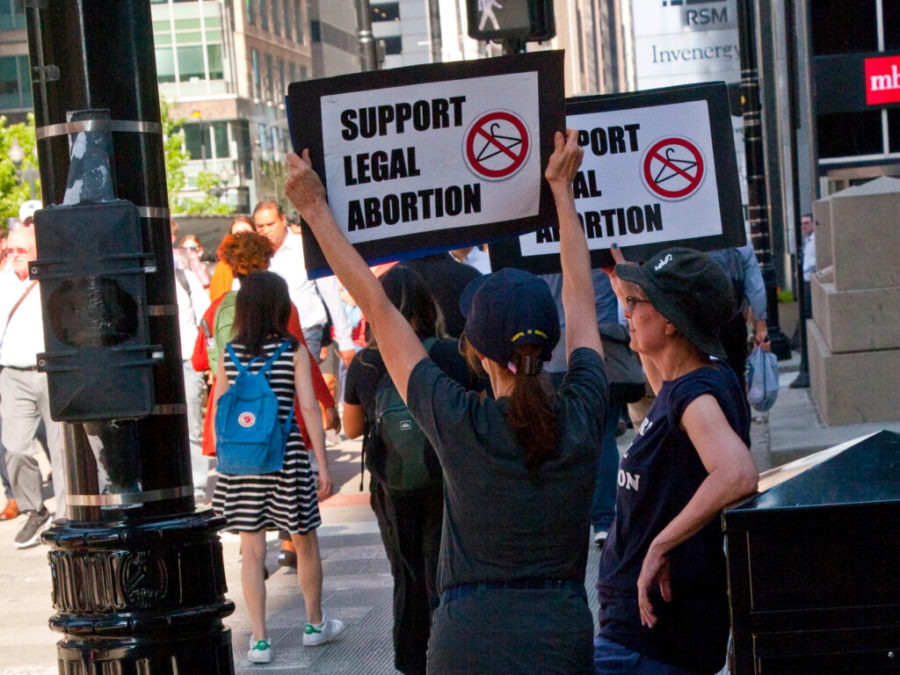Abortion Laws Changed in Texas, Setting Up Supreme Court Battle
Texas residents supporting abortions.
October 29, 2021
Abortion is a serious topic that can affect people in many different ways. It can go two ways, either good or bad. Many women all over the world have abortions. In America, roughly one in four women get abortions. Some Americans do not support this while others do. The majority of voters say that women should not have an abortion performed after 20 weeks. In addition, the majority of the voters voted that abortion should be legal. In the United States, they are legal, but recently various states have begun the process of challenging the landmark case of Roe v. Wade, the Supreme Court Case from 1973 which made abortion legal across the country.
Currently, abortion laws have changed in Texas. A Texas law, that the U.S. Supreme Court has let stand, bans abortions after six weeks into the pregnancy. This is a law gives women the right to sue their doctors who have performed an abortion, past six weeks before they know they are pregnant. The Supreme Court and Texas are looking into ways to change the laws, if they need to be changed. If Texas does decide to ban all abortions after six weeks, it will be the most restrictive state in the United States towards abortions and abortion laws.
This is a difficult subject to touch on because so many people have different types of emotions and feeling towards abortions.
Abortions can happen because of many reasons such as: trauma, rape, sexual harassment, stress, not being able to support for the child, not being able to love the child, unprotected sex, etc.. Usually, depending where you are located in the United States, your insurance will not cover the procedure, even if you are under the age of 18 years old. The morning after pill, otherwise known as Plan B, can go from about 40 to 50 dollars. The actual surgical procedure of abortion can sometimes run from about two thousand dollars all the way to eight thousand dollars.
In the United States, depending on which state you live in, some women need parental consent in order for this procedure to happen. If you are 18 or older, this is all your choice and you don’t need to tell anyone, but the medical profession recommends that you have someone with you for support.
There are many women who do regret getting the abortion done. It can cause pain that can sometimes lead to depression; however, there are many places that can help you grieve from the loss, including counseling and therapy.


Abortion Methods:
There are two kinds of abortion methods.
- The Abortion Pill. This is made up of two different types of medicines known as mifepristone and misoprostol. This medication will cause a lot of cramping and bleeding to clean out the uterus which carries the fetus. Many people relate to this as a very heavy period but with symptoms of a miscarriage. You have to take this pill within 5 days after unprotected sex in order for this method to be effective.
- The In-Clinic Abortion. This is an abortion which is considered a surgical procedure because they do numb the area. The doctors will preferably want you to be less than 12-weeks pregnant. It will be harder to find a doctor who will perform this procedure if you are over the 12-week mark. Before the abortion is performed, they sedate the woman in order to help her stay calm and not feel as much pain. The nurse or doctor may give her medication in order for the cervix to open up. Then the doctor will insert a speculum, and numb the cervix. After this the doctor will insert a thin suction which will slowly take out the fetus out and clean the uterus while removing the pregnancy tissue.
Birth Control:
There are so many types of birth control. No birth control guarantees 100 percent to prevent pregnancy, and there can be certain pros and cons depending on the birth control.
Pros:
- Clear up acne
- Less cramps when you are on your period
- Can be used after an abortion
- Can lessen your risk of ovarian cancer
- Less bleeding when you’re on your period
- Teens can be on birth control
Cons:
- It may delay your period
- Can cause mood swings
- Have to have it every day (pill form)
- Doesn’t protect against sexually transmitted diseases such as HIV, AIDS and more.
In some clinics they will be able to inert an IUD right after the abortion is performed to stop future pregnancies. An IUD is a form of birth control.
There is also something called Plan B. This is essentially a pill that you can take the morning after sexual intercourse. It will stop a woman from having a fetus develop in their body. This pill can cost about $40-$45 in the United States. It can also be purchased in stores such as CVS, Ride Aid, Pharmacy’s, Target, Walmart and selected grocery stores.




Britany • Nov 27, 2021 at 7:57 pm
Amazing!!